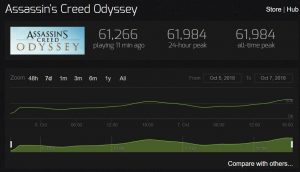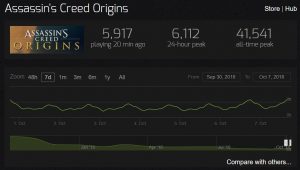It appears that Assassin’s Creed Odyssey is selling well on the PC platform. According to Steam’s statistics, its highest concurrent player number has already surpassed the one for Origins, hinting at a better overall launch.
Going into slightly more details, the all-time peak number of concurrent players for Assassin’s Creed Odyssey is currently 61,984 whereas the all-time peak number of concurrent players for Assassin’s Creed Origins was 41,541. In other words, we are looking at a 51% increase in concurrent players.
Of course these numbers are not 100% representative of the Steam sales, however they do show a better overall launch than the one for Origins. According to Steamspy, Origins has sold between 1-2 million copies on Steam, whereas Odyssey is currently around 200-500K sold copies (do note that Steamspy’s numbers are delayed by two-three days so the real sales for Odyssey are obviously higher).
But anyway, it appears that the Steam launch of Odyssey was better than the one for Origins and it remains to be seen whether Ubisoft will address some of the issues that PC gamers have with Odyssey, and whether the game will be able to surpass Origins’ sales.
As we’ve already stated, Ubisoft is currently working on patch 1.03 for Assassin’s Creed Odyssey that will feature some PC-specific fixes/tweaks. The rainy weather during the Benchmark session will be fixed in version 1.03 and Ubisoft will also fix the VRAM meter bug that sometimes does not update in real-time, as well as the “Dialogue with Barnabas” bug.

John is the founder and Editor in Chief at DSOGaming. He is a PC gaming fan and highly supports the modding and indie communities. Before creating DSOGaming, John worked on numerous gaming websites. While he is a die-hard PC gamer, his gaming roots can be found on consoles. John loved – and still does – the 16-bit consoles, and considers SNES to be one of the best consoles. Still, the PC platform won him over consoles. That was mainly due to 3DFX and its iconic dedicated 3D accelerator graphics card, Voodoo 2. John has also written a higher degree thesis on the “The Evolution of PC graphics cards.”
Contact: Email



